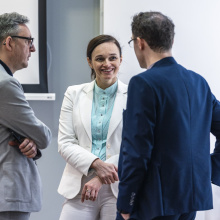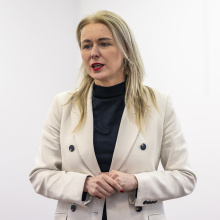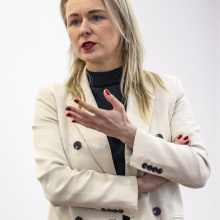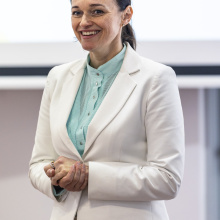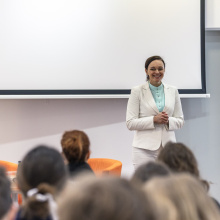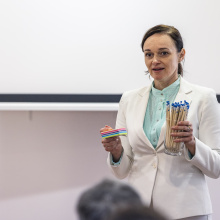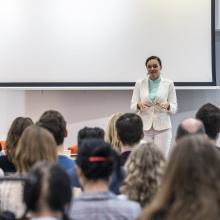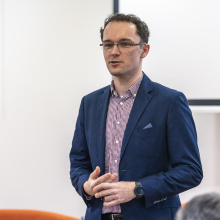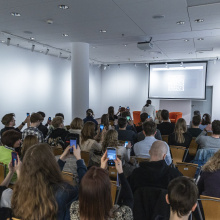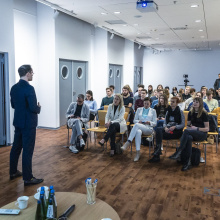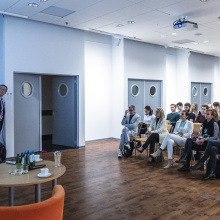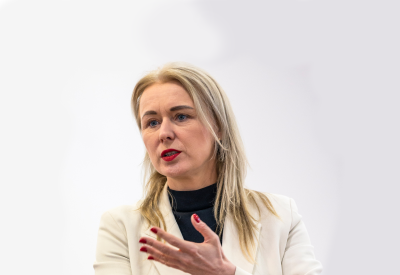
The fourth day of the Intellectual Property & Innovation Week conference was dedicated to entrepreneurship. Among other things, the students attending the event learned how to build a thriving business from an idea and what are the ups and downs of working in corporations and start-ups.
The Vice-Rector for Cooperation and Development, dr hab. Sylwia Mrozowska, prof. UG, spoke first. ‘Today's event is a kind of kick-off meeting for a new initiative at the University, coordinated by Ms Izabela Disterheft. Namely, we would like to stimulate the entrepreneurial spirit of our students and bring them into contact with people who have a wealth of experience in entrepreneurship already at the university level. At today's meeting, we have quite a diverse group of speakers, precisely so that we can get to know your expectations as well. We would like to hear from you and we would like you to tell us what you are most interested in after the presentations. We want you to learn how to build your career, CV or portfolio of competencies so that you end up in the labour market where you dream of being,’ said dr hab. Sylwia Mrozowska, prof. UG, to the students. ‘We want you to listen to the speakers, listen to their stories. It seems to me that showing how varied career paths can be and what things you can do after different studies will allow you to open up to interdisciplinarity,' she added.
Izabela Disterheft from the UG's Office of Analysis and Expertise spoke next: 'Working for a company in the City of Gdańsk, I realised that for you to be able to enter the labour market, there has to be something called the golden triangle, that is, there has to be cooperation between universities, local government, city or regional authorities and business,' she said. She then introduced the profiles of all the speakers.
The first lecture, entitled ‘Start-ups and Corporations - the Glories and Shadows’, was given by Arkadiusz Gasperczyk, HR Director at WIPRO. In the beginning, he and the assembled guests pointed out the pros and cons of working in both a corporation and a start-up. During this interaction, the perceptions that students have of the employee profile of small companies and large enterprises became apparent. ‘If you want to learn from someone, it seems to me that a start-up is not necessarily going to be the best path. You have to take into account the fact that if you want to develop yourself, then yes, you will gain experience, but later, when you want to embed your knowledge and use it to work for another organisation, it may turn out that this experience is completely inadequate,' said Arkadiusz Gasperczyk. The presentation went on to briefly discuss examples of crises in large corporations and examples of corporations that highly value corporate social responsibility.
‘If you care about stability, working for a corporation will probably be a better option,' argued the speaker. ‘Let the choice of organisation depend on your individual preferences. So if you talk to your friends and rely on their opinions, I have a piece of advice for you: don't do it. Ask yourself what you care about,’ he added. Arkadiusz Gasperczyk then talked about his professional experience, both in corporations such as Accenture, Nationale Nederlanden, ING and Wipro, and in start-ups: Lingaro and RTB House. ‘When thinking about your career, ask yourself what your goal is. Are you looking for a challenge and, for example, want to patriotically build a company to conquer foreign markets, or do you need career development and want to learn something,’ he concluded.
Next, Anna Gustowska and Natalia Krancewicz, founders of Pełna Chata, talked about their business idea and their path with obstacles to success. The final talk on the fourth day of Intellectual Property & Innovation Week was the presentation ‘Digitisation and Business Information Management - what are they and why are they important?’ by BIM Association President Aleksander Szerner, Market Expert for BIM, Digitisation, PROPTECH and Digital Business Solutions.

